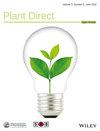Screening of leaf extraction and storage conditions for eco‐metabolomics studies
IF 2.3
3区 生物学
Q2 PLANT SCIENCES
引用次数: 0
Abstract
Mass spectrometry‐based plant metabolomics is frequently used to identify novel natural products or study the effect of specific treatments on a plant's metabolism. Reliable sample handling is required to avoid artifacts, which is why most protocols mandate shock freezing of plant tissue in liquid nitrogen and an uninterrupted cooling chain. However, the logistical challenges of this approach make it infeasible for many ecological studies. Especially for research in the tropics, permanent cooling poses a challenge, which is why many of those studies use dried leaf tissue instead. We screened a total of 10 extraction and storage approaches for plant metabolites extracted from maize leaf tissue across two cropping seasons to develop a methodology for agroecological studies in logistically challenging tropical locations. All methods were evaluated based on changes in the metabolite profile across a 2‐month storage period at different temperatures with the goal of reproducing the metabolite profile of the living plant as closely as possible. We show that our newly developed on‐site liquid–liquid extraction protocol provides a good compromise between sample replicability, extraction efficiency, material logistics, and metabolite profile stability. We further discuss alternative methods which showed promising results and feasibility of on‐site sample handling for field studies.为生态代谢组学研究筛选叶片提取和储存条件
基于质谱的植物代谢组学常用于鉴定新型天然产物或研究特定处理对植物代谢的影响。为避免伪影,需要可靠的样品处理,这就是为什么大多数方案都要求将植物组织置于液氮中震荡冷冻,并建立不间断的冷却链。然而,这种方法在后勤方面的挑战使得它在许多生态研究中并不可行。特别是对于热带地区的研究来说,永久冷却是一个挑战,这也是许多研究使用干燥叶片组织代替的原因。我们共筛选了 10 种从玉米叶片组织中提取植物代谢物的提取和储存方法,这些方法跨越了两个种植季节,目的是为热带地区具有后勤挑战性的农业生态研究开发一种方法。所有方法都是根据在不同温度下储存 2 个月期间代谢物特征的变化进行评估的,目的是尽可能再现活体植物的代谢物特征。我们的研究表明,我们新开发的现场液-液萃取方案在样品的可复制性、萃取效率、材料物流和代谢物图谱的稳定性之间实现了良好的折中。我们还进一步讨论了其他方法,这些方法显示出了良好的效果以及现场样品处理在野外研究中的可行性。
本文章由计算机程序翻译,如有差异,请以英文原文为准。
求助全文
约1分钟内获得全文
求助全文
来源期刊

Plant Direct
Environmental Science-Ecology
CiteScore
5.00
自引率
3.30%
发文量
101
审稿时长
14 weeks
期刊介绍:
Plant Direct is a monthly, sound science journal for the plant sciences that gives prompt and equal consideration to papers reporting work dealing with a variety of subjects. Topics include but are not limited to genetics, biochemistry, development, cell biology, biotic stress, abiotic stress, genomics, phenomics, bioinformatics, physiology, molecular biology, and evolution. A collaborative journal launched by the American Society of Plant Biologists, the Society for Experimental Biology and Wiley, Plant Direct publishes papers submitted directly to the journal as well as those referred from a select group of the societies’ journals.
 求助内容:
求助内容: 应助结果提醒方式:
应助结果提醒方式:


